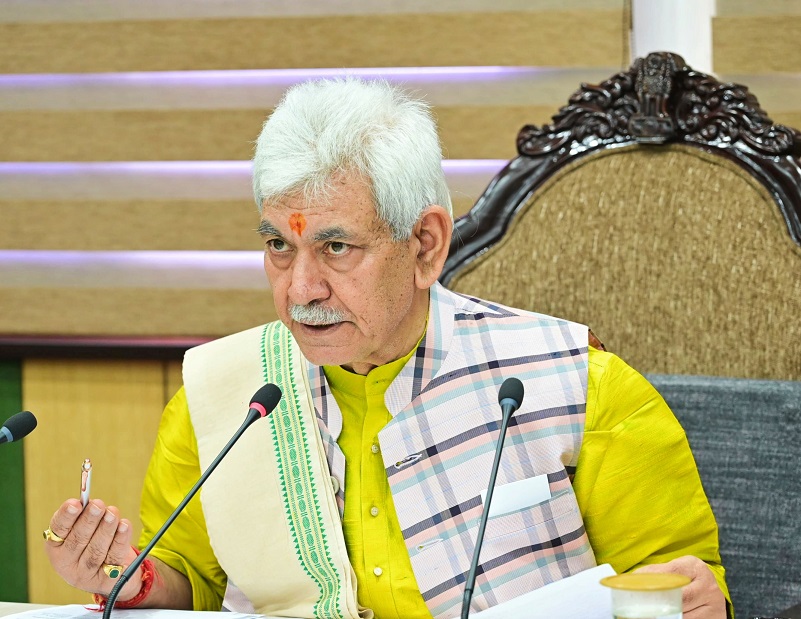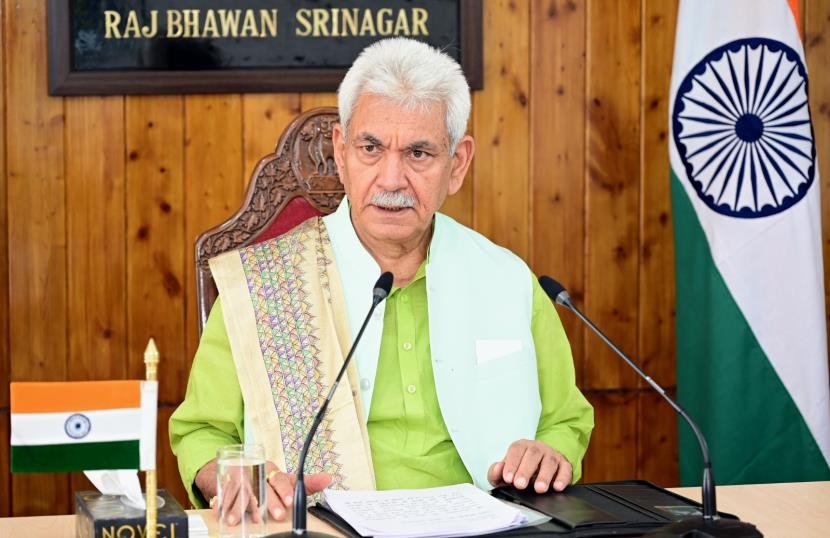By Ajaz Rashid
Lieutenant Governor Manoj Sinha on Saturday painted a picture of a transforming Jammu and Kashmir, asserting that terrorism in the region is “on its last legs” and describing the ecosystem of subversive and anti-national elements as being in the “ICU” (Intensive Care Unit). Addressing multiple gatherings across Srinagar, including an event with the Pahari Tribal Community, he urged citizens to remain vigilant and ensure that such elements do not receive “oxygen” from any quarter.
“During the past five to six years, Jammu and Kashmir has taken a significant flight towards development and prosperity, but there are still some individuals who are unable to digest this progress,” Sinha said. “Certain elements are still trying to instigate civilians. These need to be exposed and dealt with firmly. One dirty fish spoils the entire pond. Even a single subversive element is enough to disturb peace. People should come forward and inform security forces about such elements so that law can take its own course.”
The Lieutenant Governor emphasized the role of influential people in shaping public opinion, urging them not to mislead communities and to contribute toward building a “Viksit Bharat.” “India is the fastest-growing economy in the world. During the past five to six years, J&K’s economy has doubled. We need to maintain this pace and carry it forward,” he said, highlighting unprecedented progress across the Union Territory in recent years.
Sinha drew attention to the changing dynamics in the Valley, noting, “Unfortunately, we have a neighbour who, through terrorism and a few subversive elements, is hell-bent upon disturbing peace. But things have changed—the places that were once discussed for all the wrong reasons are now hosting Tiranga rallies. Today the tricolour flies high in Pulwama and Lal Chowk. After the Pahalgam terror attack, Kashmir stood up against terrorists and sent out a clear message. This is no ordinary change; it’s a big change.”

Reaffirming the commitment of security forces, he said, “The day is not far when J&K will be terrorism-free. We have to provide a terror-free J&K to future generations.” He added that serving humanity selflessly is a noble virtue, noting, “While people often think about safeguarding their own interests, those who work for the welfare of others set the right example.”
Highlighting climate change as one of the most pressing challenges of the era, Sinha recalled the floods in Jammu that caused massive infrastructural damage, including roads, schools, and colleges. “However, the biggest loss is the loss of lives, and no amount of money can compensate that,” he said. Citing visits by senior leaders like the Defence Minister and Union Home Minister to express solidarity, Sinha underscored, “Infrastructure can be rebuilt, but the damage being caused to the environment cannot be compensated. Our connection with the environment has been broken, and it is crucial to restore this balance.”
Sinha invoked the words of renowned scientist Stephen Hawking and Mahatma Gandhi to stress the importance of environmental responsibility, saying, “It is important to strike a balance with nature. The message is clear—we must act responsibly for the sake of future generations.”
On terrorism, the LG noted a dramatic decline in youth recruitment, pointing out that “only one local youth has joined a terror outfit so far this year.” He said, “J&K has suffered from terrorism for a long time. Security forces, the Army, police, and administration are doing their work, but as citizens of J&K, it is our responsibility to ensure that we don’t indulge in any activity that leads to disruptions.”
He noted that stone pelting, once a major concern in the Valley, “has become history,” and cautioned against falling prey to misleading propaganda. “Narratives cause big damage. If our statements resemble what is written on the social media handle of The Resistance Front (TRF), it is dangerous,” he said, while criticizing Pakistan’s interference: “We have such a neighbour who gets a stomach-ache every now and then. Instead of focusing on its own problems, Pakistan keeps meddling in our affairs. When Pakistan was formed, it attacked J&K and has lost four conventional wars. Pakistan knows very well that it cannot defeat Indian Army in the battlefield.”
Sinha hailed the abrogation of Article 370 in August 2019 as a landmark moment for the region, calling it “an important milestone” in J&K’s history. “All laws implemented in the rest of the country were extended to J&K,” he said. “Children received the Right to Education, sanitation workers benefited, and key laws such as those for Dalits and the Minimum Wages Act were implemented here after 2019.”
He also stressed social justice and inclusion, pointing to the granting of Scheduled Tribe status to the Pahari community, strengthening of the Forest Rights Act, and the launch of Janjatiya Gaurav Diwas. “Now equal rights are being given to you, and you will receive them—no one can stop you. What is your right will be given to you,” Sinha said. He urged tribal communities and all sections of society to unite against terrorism and actively counter extremist propaganda to safeguard peace and stability.
Reflecting on India’s broader trajectory, Sinha highlighted the nation’s growing economic strength: “After independence, our growth rate remained low for a long time, but after the 1990s, momentum picked up. It is essential that the benefits reach everyone, and corruption, which creates many obstacles, must be eradicated.”
He noted that terrorism and left-wing extremism have significantly declined across the country, particularly in the Northeast, and expressed confidence that Naxalism will soon be eliminated. “J&K has suffered for a long time, and its end is necessary,” he said. Calling for introspection and active participation in nation-building, he concluded, “We must ask ourselves what we have done for the country that has given us everything. I hope we will work for the welfare of India.”

In his addresses, LG Sinha conveyed a message of hope, resilience, and responsibility, underscoring that Jammu and Kashmir’s path toward peace, development, and environmental stewardship depends not just on policy and security forces, but on the active participation and vigilance of its citizens. (With inputs from KNO)